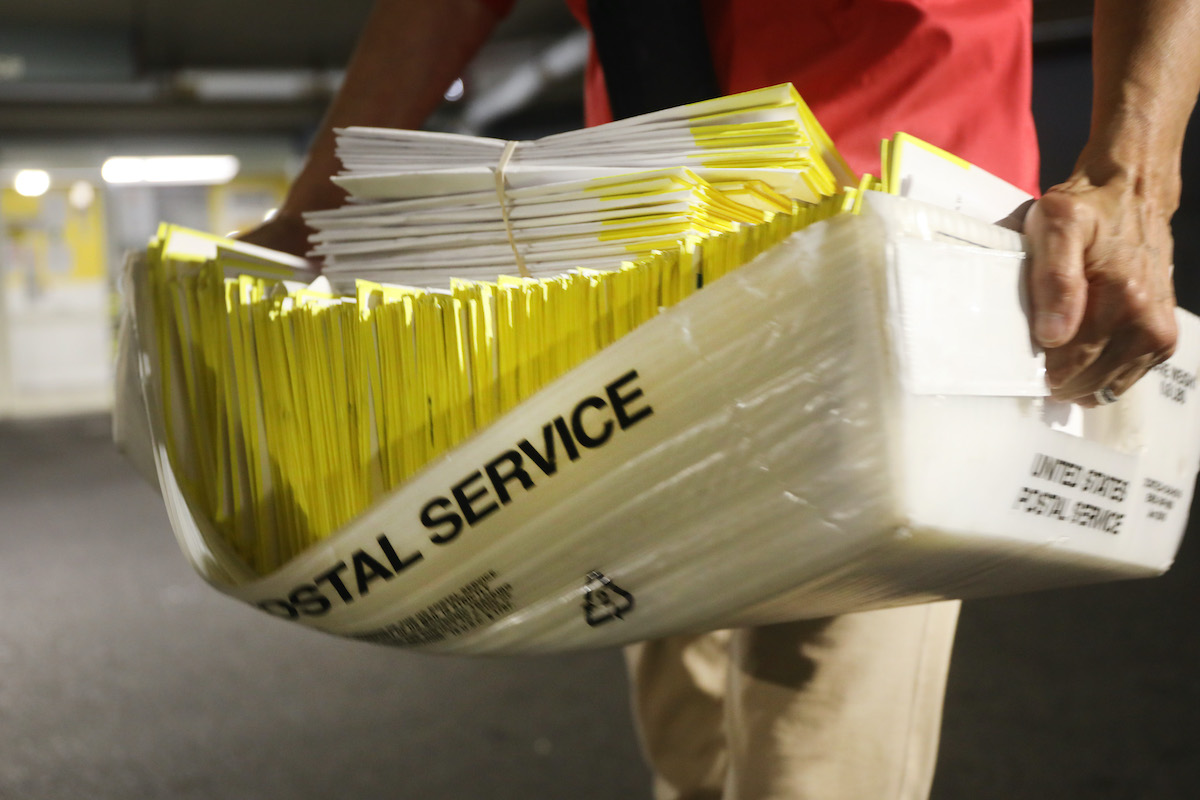Donald Trump Keeps Screaming About Nonexistent Voter Fraud When Absentee Ballot Rejections Are an Actual Problem

Donald Trump has not eased off of his rabid scaremongering over the nonexistent perils of mail-in voting. On Twitter and during his dangerous in-person rallies, he’s been repeating the conspiracy theory that voting by mail is a scam designed by Democrats to steal the election. That’s absurd and as we’ve established many, many times already, mail-in voting is extremely reliable and there are numerous safeguards in place to prevent fraud.
There is, however, one big problem with absentee voting (which, no matter how many times Trump says otherwise, is the same as mail-in voting) that we’re not hearing nearly enough about: ballot rejection.
In a typical election, thousands of absentee ballots are rejected for a number of issues, from arriving late to issues with signatures to a missing or illegible postmark. Trump, who has himself voted by mail for years, wrote the wrong birthday on his absentee ballot application for a special mayoral election in 2017. According to the Independent, in that same election, Melania Trump forgot a signature, Ivanka Trump returned her ballot late, and Jared Kushner didn’t return his ballot at all. So clearly there is work to be done in educating people on how to vote by mail!
Making all of this even more pressing is the racial disparity in the ballots that are rejected. In a typical presidential election, thousands of ballots are rejected, either because of voter error or because the voter decides to vote in person instead after already returning their ballot (that thing Trump is telling all of his supporters to do). But absentee ballots typically only make up about 10% of total votes. Because of COVID-19, far more people are voting by mail than ever before, meaning far more ballots are being rejected.
According to NPR, more than 550,000 ballots have been rejected this year so far. And recent data shows that those are majorly disproportionately ballots from BIPOC voters.
So far in NC, November 2020 mail ballots cast by Black voters are being rejected at *four times* the rate of those cast by white voters. https://t.co/flkr0g7AwR
— Dave Wasserman (@Redistrict) September 12, 2020
If you’re voting by mail, here are some things you can do to make sure your vote is counted:
—Double and triple-check that your ballot and the envelope are filled out correctly before sealing and mailing it, especially if it’s your first time voting by mail, when people are most likely to make mistakes. Make sure your signature on your ballot matches your signature on your ballot application exactly. This is a common cause of ballot rejection.
—Know your deadline and return your ballot early! Donald Trump has already returned his mail-in ballot, you can too! If you haven’t yet applied for an absentee ballot (and live in a state that’s not sending them automatically), there’s still time to request one.
—Track your ballot. Most states and/or counties have tools that let you track your ballot. A few, like Colorado, will automatically update you on the status of your ballot but in most cases, check to see if there’s a tracking number or slip on your ballot that you’ll want to hang on to. You can Google “how to track your ballot” + your state to find out more about your specific ballot since there’s no federal standard for this and the federal government is instead trying to make it harder and more confusing to vote by mail.
—If your ballot is rejected, and if you feel safe doing so, you can still vote in person! You may be asked to fill out a provisional ballot, which a lot of people don’t like because they’re not counted until later. But in this election, we’re likely not going to get results until some time after election day anyway, so take that provisional ballot and know your vote will still be counted! (ETA: Some states have different rules regarding how and if you can vote in person after requesting an absentee ballot, so check yours first!)
(image: Spencer Platt/Getty Images)
Want more stories like this? Become a subscriber and support the site!
—The Mary Sue has a strict comment policy that forbids, but is not limited to, personal insults toward anyone, hate speech, and trolling.—
Have a tip we should know? tips@themarysue.com